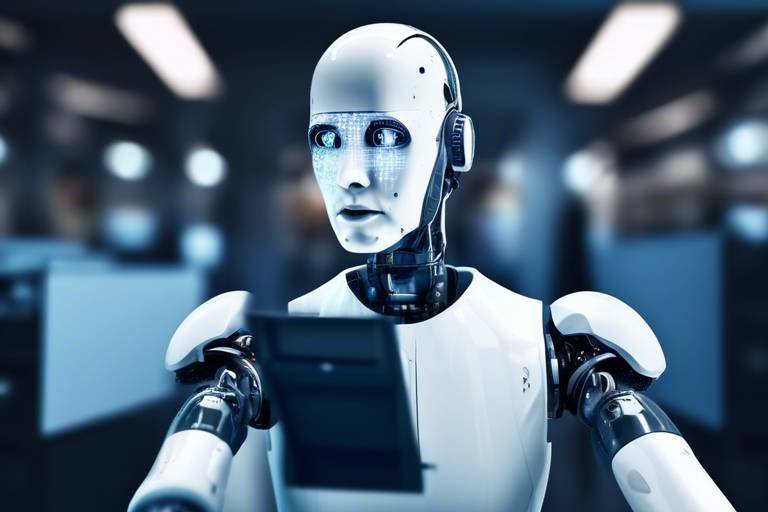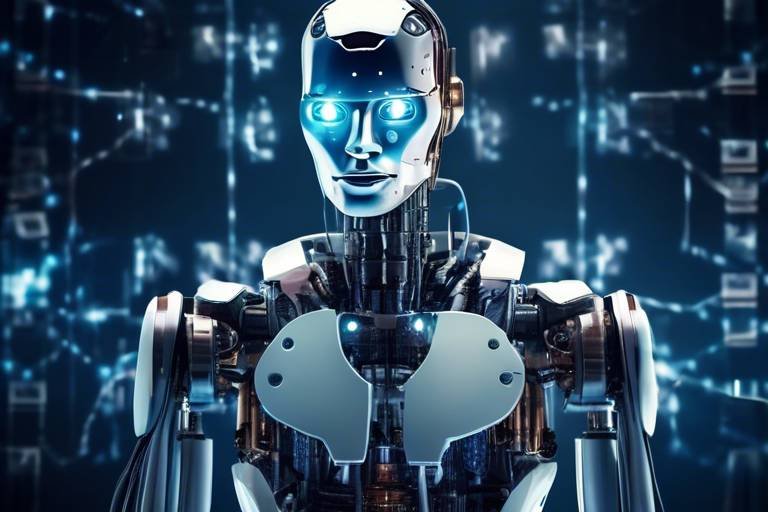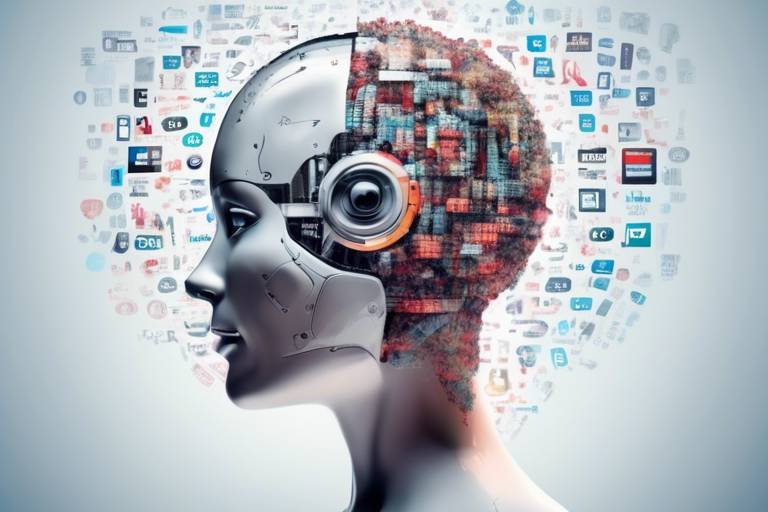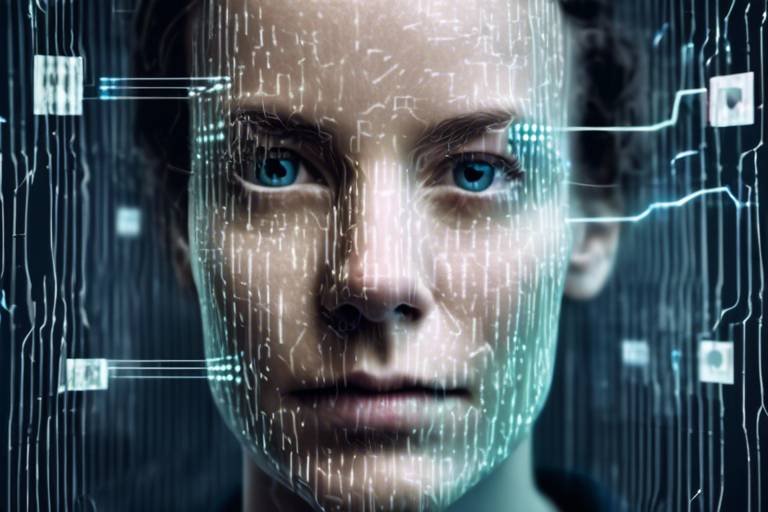The Impact of AI on Job Market
The advent of artificial intelligence (AI) has sparked a revolution in various sectors, fundamentally altering the job market landscape. Imagine waking up one day to find that your job, which once felt secure, is now being performed by a machine. This is not just a futuristic scenario; it's happening right now. As AI technology progresses, it reshapes employment opportunities, modifies job roles, and transforms the skills required across numerous industries. The implications are profound, encompassing both promising advancements and daunting challenges. What does this mean for the average worker? How can one navigate this shifting terrain?
As we dive deeper into the effects of AI, it becomes clear that the traditional job market is undergoing a metamorphosis. The notion of job displacement looms large, particularly in sectors like manufacturing and customer service. Here, AI technologies are expected to replace a significant number of roles, leading to a drastic transformation in the workforce. Workers who have relied on these jobs for stability must now confront the reality of retraining and developing new skills to remain relevant. The landscape is changing, and those who adapt will thrive, while others may find themselves left behind.
However, it's not all doom and gloom. While AI may displace certain jobs, it also heralds the creation of new roles that didn't exist a decade ago. Fields such as data analysis, AI maintenance, and ethical AI governance are emerging rapidly, necessitating a shift in workforce skills and education. These new roles require a different set of skills, pushing the boundaries of what we consider essential knowledge in the workplace. As we transition into this new era, the demand for skills like programming, data literacy, and critical thinking will soar. This shift calls for a reevaluation of educational curricula to prepare future workers adequately.
To adapt to the advancements in AI, workers must engage in upskilling and reskilling initiatives. This means taking proactive steps to learn new technologies and methodologies that align with the changing job market. The days of a single degree being sufficient for a lifetime career are fading. Instead, continuous learning will become a cornerstone of career longevity. Educational institutions play a crucial role in this transition, emphasizing the importance of STEM education and interdisciplinary approaches to learning. They must equip students with the necessary skills to thrive in AI-related jobs, fostering a culture of lifelong learning.
Moreover, the integration of AI into the workplace has significant implications for workforce diversity. As companies increasingly prioritize tech-savvy candidates, there is a risk of sidelining underrepresented groups. If proactive measures are not taken to promote inclusivity, the job market could become even more homogeneous. It’s essential for organizations to recognize this challenge and implement strategies to ensure a diverse workforce. This includes creating supportive environments and opportunities for all candidates, regardless of their background.
The economic implications of AI's rise are far-reaching. We are witnessing shifts in labor demand, wage changes, and potential impacts on economic inequality that require careful attention from policymakers. As the job market evolves, it is crucial to address these issues to prevent widening the gap between those who can adapt to AI advancements and those who cannot. Governments and organizations are exploring various policy responses to mitigate the negative effects of AI on employment, such as implementing universal basic income or enhancing social safety nets for displaced workers. These discussions are vital as we navigate this new landscape.
Looking ahead, the future job market will likely continue to transform as AI technology advances. This ongoing evolution will require continuous adaptation from both workers and employers. The key to thriving in this new environment lies in embracing change, being open to learning, and fostering a culture of innovation. The question remains: Are we ready to face the challenges and seize the opportunities that AI presents? Only time will tell, but one thing is certain: the impact of AI on the job market is profound and cannot be ignored.
- Will AI take away my job? - While AI may displace some jobs, it also creates new opportunities. Adapting through upskilling can help you stay relevant.
- What skills should I learn to prepare for an AI-driven job market? - Skills such as programming, data literacy, and critical thinking are increasingly in demand.
- How can educational institutions help with the transition to an AI-focused job market? - By emphasizing STEM education and fostering interdisciplinary learning, schools can better prepare students for future roles.
- What are some policy responses to the challenges posed by AI? - Governments are considering solutions like universal basic income and enhanced social safety nets to support displaced workers.

Job Displacement
As we dive into the realm of artificial intelligence (AI), it's impossible to ignore the profound impact it's having on the job market. AI technology is anticipated to replace numerous jobs, particularly in sectors like manufacturing and customer service. Imagine walking into a factory where robots are doing the work that once required dozens of human hands. This shift isn't just about machines taking over; it's about significant workforce changes that are reshaping how we think about employment. The reality is that many traditional roles are becoming obsolete, and this can be a daunting prospect for workers who have invested years honing their skills.
With automation on the rise, the need for retraining and skill development becomes paramount. Workers in affected industries may find themselves at a crossroads, faced with the challenge of adapting to a new landscape where their previous roles no longer exist. For instance, consider a customer service representative whose job is replaced by a sophisticated AI chatbot. What happens to that individual? This scenario highlights the urgent need for programs that facilitate a smooth transition for those displaced by technology.
Furthermore, the impact of job displacement isn't uniform across all demographics. Certain groups may be disproportionately affected, leading to potential economic inequalities. For example, lower-skilled workers might find it harder to pivot to new roles compared to those with higher education or specialized skills. This raises an important question: How can we ensure that everyone has access to the necessary training and resources to thrive in an AI-driven world?
To better understand the sectors most at risk of job displacement, let's take a look at the following table:
| Industry | Jobs at Risk | Potential for Automation |
|---|---|---|
| Manufacturing | Assembly line workers | High |
| Customer Service | Call center agents | High |
| Transportation | Truck drivers | Medium |
| Retail | Cashiers | Medium |
In conclusion, while the rise of AI presents exciting opportunities for innovation and efficiency, it also brings with it the challenge of job displacement. The transition to an AI-driven economy will require not only a shift in mindset but also a concerted effort from businesses, educational institutions, and policymakers to ensure that workers are equipped to navigate this new terrain. It's clear that proactive measures must be taken to address these challenges, ensuring that the workforce is prepared for the future.
- What types of jobs are most at risk due to AI? Jobs in manufacturing, customer service, and transportation are among the most vulnerable to automation.
- How can displaced workers find new opportunities? Engaging in retraining and upskilling programs can help workers transition into new roles.
- What role do educational institutions play in this transition? They are crucial in providing the necessary skills and knowledge required for emerging job roles in an AI-driven market.

Emerging Job Roles
As we stand on the brink of a new era shaped by artificial intelligence, the job market is witnessing a fascinating transformation. While it's true that AI is set to displace certain jobs, it simultaneously paves the way for an array of that didn't exist a decade ago. Think of it this way: just as the internet created opportunities for web developers and digital marketers, AI is now crafting new career paths that require a unique blend of skills and knowledge.
Among the most promising roles are those in data analysis. With companies generating vast amounts of data, there is a growing need for professionals who can interpret this information and derive actionable insights. Data analysts play a crucial role in helping businesses make informed decisions, and as AI tools become more sophisticated, the demand for these experts will only increase. They act like modern-day detectives, sifting through data to uncover trends and patterns that can lead to better business strategies.
Another exciting area is in AI maintenance. As more organizations adopt AI systems, the need for individuals who can maintain, troubleshoot, and optimize these technologies will surge. This role is akin to being a mechanic for the digital age, ensuring that AI systems run smoothly and efficiently. Companies will require professionals who not only understand how to operate AI tools but can also identify and resolve potential issues before they escalate.
Moreover, the concept of ethical AI governance is gaining traction. As AI continues to permeate various aspects of our lives, the question of ethics becomes paramount. Professionals in this field will focus on ensuring that AI systems are designed and implemented responsibly, addressing concerns related to bias, privacy, and accountability. They will act as guardians of ethical standards, much like referees in a game, ensuring that the rules are followed and that everyone plays fair.
In addition, roles such as AI trainers are emerging. These individuals will be responsible for teaching AI systems how to perform specific tasks by providing them with the right data and feedback. It's a bit like training a pet; you need patience, understanding, and a clear strategy to ensure the AI learns effectively. This role is critical because the performance of AI systems relies heavily on the quality of training they receive.
To encapsulate the rapidly changing landscape, here’s a brief overview of some of the key emerging job roles in the AI domain:
| Job Role | Description | Skills Required |
|---|---|---|
| Data Analyst | Interprets complex data to help businesses make informed decisions. | Statistical analysis, data visualization, critical thinking. |
| AI Maintenance Specialist | Ensures AI systems are functioning optimally and resolves any technical issues. | Technical troubleshooting, programming, systems management. |
| Ethical AI Governance Professional | Focuses on the ethical implications of AI technologies and ensures compliance with standards. | Knowledge of AI ethics, policy development, risk assessment. |
| AI Trainer | Trains AI systems to perform tasks by providing data and feedback. | Data curation, machine learning principles, patience. |
These roles not only highlight the adaptability required in the workforce but also underscore the importance of upskilling and reskilling to thrive in this AI-driven landscape. As we navigate through these changes, it’s essential to remain open-minded and proactive about learning new skills that align with the demands of the evolving job market.
- What are some examples of emerging job roles due to AI?
Roles such as data analysts, AI maintenance specialists, ethical AI governance professionals, and AI trainers are becoming increasingly important. - How can I prepare for a career in an AI-related field?
Consider pursuing education in data science, programming, or ethics in technology, and look for opportunities to gain hands-on experience through internships or projects. - Will AI completely replace human jobs?
While AI will replace some jobs, it will also create new roles that require human skills, particularly in areas that involve creativity, emotional intelligence, and ethical considerations.

Skills in Demand
As we navigate through the ever-evolving landscape of the job market, it's clear that certain skills are becoming increasingly essential. The rise of artificial intelligence (AI) is not just a trend; it's a fundamental shift that is reshaping how we work and what we need to know. Gone are the days when a basic understanding of technology was sufficient. Now, to thrive in this new environment, individuals must equip themselves with a diverse set of skills that align with the demands of AI-driven industries.
One of the most sought-after skills today is programming. Knowledge of languages such as Python, Java, and R is invaluable, as these are the tools that power AI algorithms and data analysis. But programming is just the tip of the iceberg. As businesses increasingly rely on data to make decisions, data literacy has emerged as a crucial competency. Workers need to be able to interpret data, draw insights, and make data-driven decisions. This skill set not only enhances individual performance but also contributes to the overall success of an organization.
Moreover, critical thinking and problem-solving skills have never been more important. With AI automating routine tasks, the ability to think creatively and tackle complex problems becomes a distinguishing factor among employees. Companies are looking for individuals who can analyze situations from multiple angles and devise innovative solutions. This is where the human touch truly shines, allowing workers to complement AI's capabilities rather than compete with them.
To further illustrate the skills that are currently in high demand, consider the following table:
| Skill | Description | Industry Relevance |
|---|---|---|
| Programming | Knowledge of coding languages to develop software and algorithms. | Technology, Finance, Healthcare |
| Data Literacy | The ability to read, analyze, and interpret data effectively. | Marketing, Business Intelligence, Research |
| Critical Thinking | Evaluating information and making reasoned judgments. | All Industries |
| AI Ethics | Understanding the ethical implications of AI technologies. | Technology, Policy, Academia |
Additionally, as AI continues to permeate various sectors, there is a growing emphasis on AI ethics. Professionals who understand the ethical implications of AI technologies are becoming increasingly valuable. They help ensure that AI systems are designed and implemented responsibly, addressing issues like bias, privacy, and accountability. This is a critical area where companies must tread carefully, as public trust hinges on ethical practices.
In summary, as the job market evolves, the demand for specific skills will continue to shift. It's essential for current and future workers to stay informed and proactive in developing these skills. By embracing programming, data literacy, critical thinking, and an understanding of AI ethics, individuals can position themselves as invaluable assets in an AI-driven world.
- What skills are most important for working with AI? Programming, data literacy, critical thinking, and AI ethics are currently the most sought-after skills.
- How can I improve my data literacy? Consider taking online courses or workshops that focus on data analysis and interpretation.
- Is programming necessary for all jobs in the AI field? While not all roles require programming, having a basic understanding can significantly enhance your employability.
- What role does AI ethics play in the job market? Understanding AI ethics is crucial to ensure responsible implementation of AI technologies and to maintain public trust.

Upskilling and Reskilling
As the landscape of the job market evolves due to the rise of artificial intelligence, the concepts of upskilling and reskilling have never been more critical. Workers find themselves at a crossroads, where the skills they once relied upon may no longer suffice in an AI-driven world. So, what does it mean to upskill or reskill? In simple terms, upskilling refers to enhancing existing skills to keep pace with technological advancements, while reskilling involves learning entirely new skills to transition into different job roles. Both strategies are essential in ensuring workers remain competitive and relevant.
Imagine being a skilled craftsman, accustomed to hand tools, only to find that the industry has shifted to automated machinery. Without the ability to adapt, that craftsman risks obsolescence. Similarly, today’s workers must embrace continuous learning to navigate the rapid changes brought about by AI. This shift is not just about survival; it’s about thriving in a world where technology is intertwined with every aspect of work.
To facilitate this transition, companies and educational institutions are stepping up to provide resources and training programs. For example, many organizations are offering workshops, online courses, and mentorship opportunities aimed at enhancing employee skill sets. Here are some common areas where upskilling and reskilling are particularly vital:
- Data Analysis: With AI generating vast amounts of data, the ability to interpret and utilize this data is invaluable.
- Programming: Understanding coding languages allows workers to interact with AI systems more effectively.
- Soft Skills: Skills like communication, problem-solving, and adaptability become increasingly important in a tech-driven environment.
Moreover, it’s not just the responsibility of the individual to pursue these opportunities. Employers also have a crucial role to play. By investing in their workforce through training programs, they not only enhance employee satisfaction but also improve overall productivity. A well-trained employee is likely to be more innovative and engaged, contributing positively to the company’s culture and success.
In this rapidly changing environment, collaboration between businesses, educational institutions, and government bodies is essential. Policymakers must consider how to fund and support upskilling initiatives, ensuring that the workforce is prepared for the challenges of tomorrow. This could include grants for training programs, tax incentives for companies that invest in employee education, or even partnerships with tech companies to create tailored training solutions.
In conclusion, the need for upskilling and reskilling is not just a trend; it is a necessity in the age of AI. Workers must take proactive steps to enhance their skills, while employers must foster an environment that encourages continuous learning. By doing so, we can create a workforce that is not only resilient but also equipped to harness the full potential of artificial intelligence.
- What is the difference between upskilling and reskilling? Upskilling involves improving existing skills, while reskilling means learning new skills for different roles.
- Why is upskilling important in the age of AI? As AI continues to evolve, workers need to adapt to new technologies to stay relevant in their fields.
- How can companies support upskilling initiatives? Companies can offer training programs, workshops, and resources to help employees enhance their skill sets.
- What role do educational institutions play in this process? Educational institutions can provide targeted training and courses that align with industry needs, preparing students for the future job market.

Role of Education
As we navigate the rapidly evolving landscape shaped by artificial intelligence (AI), the has never been more crucial. Educational institutions are at the forefront of preparing the next generation of workers for a job market that is increasingly influenced by technology. It's not just about teaching students to use AI tools; it's about fostering a comprehensive understanding of how these technologies function and their implications on various industries.
To truly equip students for success in an AI-driven world, educational programs must go beyond traditional methodologies. This means embracing STEM education (Science, Technology, Engineering, and Mathematics) while also incorporating elements of the arts and humanities. An interdisciplinary approach encourages students to think critically and creatively, skills that are essential when working alongside AI systems. For instance, a curriculum that blends coding with ethical discussions on AI can prepare students not only to develop technology but also to consider its societal impact.
Moreover, the integration of practical experiences, such as internships and hands-on projects, can significantly enhance learning outcomes. By engaging in real-world applications, students can better understand the challenges and opportunities presented by AI. This experiential learning can be a game-changer, allowing them to build a portfolio of skills that are directly relevant to employers. In fact, many companies are now seeking graduates who have not only theoretical knowledge but also practical experience in AI technologies.
To illustrate the changing educational landscape, consider the following table that highlights the key areas of focus in AI education:
| Focus Area | Description |
|---|---|
| Technical Skills | Programming, data analysis, and machine learning. |
| Critical Thinking | Evaluating AI's impact on society and ethical considerations. |
| Collaborative Projects | Working in teams to solve real-world problems using AI. |
| Continuous Learning | Encouraging lifelong learning to keep pace with technological advancements. |
In addition to formal education, online courses and boot camps have emerged as vital resources for individuals looking to upskill or reskill in AI-related fields. These platforms offer flexible learning opportunities that cater to various skill levels, making it easier for anyone to dive into the world of AI, whether they're fresh out of high school or transitioning from a different career.
Ultimately, the responsibility lies not only with educational institutions but also with policymakers and industry leaders. They must collaborate to create frameworks that support educational initiatives focused on AI. This collaboration can lead to scholarships, training programs, and resources that empower students from diverse backgrounds to thrive in the tech-driven economy.
In conclusion, the role of education in preparing the workforce for an AI-centric job market is multifaceted and essential. By adopting innovative teaching methods, fostering critical thinking, and promoting practical experiences, we can ensure that future workers are equipped to not only coexist with AI but also to harness its potential for the betterment of society.
- What skills are most important for working with AI? Skills such as programming, data analysis, and critical thinking are vital for anyone looking to work in AI-related fields.
- How can I prepare for a job in an AI-driven market? Engaging in continuous learning through formal education, online courses, and practical experiences can help you stay relevant.
- What role do educational institutions play in AI? They are responsible for equipping students with the necessary skills and knowledge to navigate an AI-infused job market.
- Are there job opportunities in AI for non-technical roles? Yes, roles in ethical AI governance, project management, and policy-making are emerging fields that require diverse skill sets.

Impact on Workforce Diversity
The integration of artificial intelligence (AI) into the workplace is a double-edged sword when it comes to workforce diversity. On one hand, AI can enhance recruitment processes by eliminating human biases, allowing for a more diverse candidate pool. On the other hand, there is a significant risk that companies may inadvertently prioritize tech-savvy candidates, which could sideline underrepresented groups. This phenomenon raises a critical question: how can organizations ensure that the benefits of AI do not come at the expense of diversity?
As companies increasingly rely on AI algorithms for hiring and promotion decisions, the potential for discrimination based on skill sets becomes a pressing concern. For instance, if an algorithm is trained predominantly on data from historically successful employees, it may favor candidates who fit a specific profile, often excluding those from diverse backgrounds. This could lead to a homogeneous workforce, which not only stifles innovation but also perpetuates existing inequalities.
To combat these challenges, it is essential for organizations to implement proactive measures that promote inclusivity. Here are some strategies that can be adopted:
- Bias Audits: Regularly auditing AI systems for biases can help identify and mitigate any discriminatory patterns in hiring.
- Diverse Teams: Building diverse teams of engineers and data scientists can lead to more equitable AI solutions, as different perspectives can highlight potential blind spots.
- Inclusive Job Descriptions: Crafting job descriptions that appeal to a broader audience can attract a more diverse range of applicants.
Moreover, training programs aimed at enhancing digital literacy among underrepresented groups can play a vital role in leveling the playing field. By equipping individuals with the necessary skills to thrive in an AI-driven job market, companies can foster a more diverse and inclusive workforce that reflects the society in which they operate.
In conclusion, while AI holds the potential to revolutionize workforce diversity, it requires careful management and intentional strategies to ensure that all voices are heard and valued. Companies that embrace diversity not only contribute to a more equitable society but also position themselves for greater innovation and success in an increasingly competitive landscape.
- How can AI improve workforce diversity?
AI can help eliminate biases in the recruitment process, allowing for a more diverse range of candidates to be considered for positions. - What are the risks of AI in hiring?
If not properly managed, AI can perpetuate existing biases and lead to a lack of diversity in the workforce. - What strategies can companies implement to promote inclusivity?
Companies can conduct bias audits, build diverse teams, and create inclusive job descriptions to foster a more diverse workforce.

Economic Implications
The rise of artificial intelligence (AI) in the job market is not just a technological shift; it's a seismic change with profound economic implications. As AI systems become more integrated into various industries, we witness a shift in labor demand that can lead to both opportunities and challenges. For instance, automation may drive down the need for low-skilled positions while simultaneously increasing demand for high-skilled jobs. This creates a paradox where some sectors flourish, while others face significant contractions.
One of the most pressing concerns is the potential for economic inequality. As AI takes over routine tasks, the gap between high-skill and low-skill workers may widen. Those with advanced skills in technology or data analysis can command higher wages, whereas workers in roles susceptible to automation may find themselves struggling to make ends meet. This disparity can lead to a two-tiered labor market, where a select few thrive while a large segment of the workforce is left behind.
Moreover, these shifts in labor demand can have ripple effects on local economies. Regions that rely heavily on manufacturing or service roles may experience economic downturns as jobs disappear. Conversely, areas that adapt and embrace AI technology could see a surge in economic activity. This necessitates a proactive approach from policymakers to ensure that economic transitions are managed effectively.
To better understand the economic implications of AI, consider the following table that outlines key areas affected:
| Area of Impact | Potential Effects |
|---|---|
| Labor Demand | Shift towards high-skill jobs; decline in low-skill positions |
| Wage Disparity | Increased income for tech-savvy workers; stagnation for low-skill workers |
| Economic Inequality | Widening gap between high-income and low-income households |
| Regional Economies | Economic decline in areas reliant on at-risk jobs; growth in tech hubs |
In light of these implications, it’s crucial for governments and organizations to implement effective policy responses. This could involve enhancing social safety nets for displaced workers or investing in education and training programs that prepare individuals for the jobs of the future. The conversation around universal basic income has gained traction as a potential solution to counterbalance the economic disruptions caused by AI. By providing a financial cushion, we can help workers transition into new roles and ensure that no one is left behind in this rapidly changing landscape.
Ultimately, the economic implications of AI are vast and multifaceted. As we navigate this new frontier, it is vital to engage in ongoing dialogue about how to leverage AI for societal benefit while mitigating its challenges. The future of work is not predetermined; it is shaped by our choices today.
- What jobs are most at risk due to AI? Jobs in manufacturing, customer service, and routine administrative tasks are particularly vulnerable to automation.
- How can workers prepare for the changes brought by AI? Engaging in upskilling and reskilling initiatives, as well as focusing on developing skills in programming, data analysis, and critical thinking, will be crucial.
- What role do governments play in addressing economic implications? Governments can implement policies such as universal basic income and enhance social safety nets to support displaced workers and encourage workforce development.

Policy Responses
The rapid rise of artificial intelligence (AI) in the job market has prompted governments and organizations worldwide to contemplate effective policy responses. As AI continues to reshape industries and displace traditional jobs, it is crucial for policymakers to implement strategies that not only address the immediate effects of job loss but also pave the way for a sustainable future. One of the most discussed approaches is the implementation of universal basic income (UBI), which provides individuals with a fixed income regardless of employment status. This concept aims to alleviate financial stress for those affected by automation and allows them to seek new opportunities without the immediate pressure of economic survival.
Moreover, enhancing social safety nets is another critical response. This includes expanding unemployment benefits, providing access to affordable healthcare, and offering support for retraining programs. Such measures can help mitigate the adverse effects of job displacement while empowering workers to transition into new roles more seamlessly. For instance, governments could collaborate with educational institutions and private companies to create tailored retraining programs that focus on the skills needed in the AI-driven economy.
Additionally, there is a growing recognition of the need for regulations and guidelines that promote ethical AI use. As AI technologies become more integrated into our daily lives, ensuring that these systems are developed and deployed responsibly is paramount. Policymakers must consider frameworks that address issues such as data privacy, bias in algorithms, and the overall impact of AI on society. By establishing clear guidelines, governments can foster an environment where innovation thrives while protecting the rights and interests of workers.
Furthermore, it is essential to promote workforce diversity in the AI sector. As companies increasingly seek tech-savvy candidates, there is a risk of sidelining underrepresented groups. Policymakers should encourage initiatives that promote inclusivity in tech education and employment, ensuring that diverse perspectives are included in the development and application of AI technologies. This can be achieved through scholarships, mentorship programs, and partnerships between tech firms and community organizations.
In summary, the policy responses to the challenges posed by AI in the job market must be multifaceted. By considering approaches like universal basic income, enhancing social safety nets, establishing ethical guidelines, and promoting workforce diversity, we can create a more resilient and equitable labor market. The road ahead may be complex, but with thoughtful policies in place, we can navigate the evolving landscape of work in the age of AI.
- What is universal basic income (UBI)? UBI is a financial support system where individuals receive a regular, unconditional sum of money from the government, regardless of their employment status.
- How can governments support workers displaced by AI? Governments can enhance social safety nets, provide retraining programs, and ensure access to affordable healthcare to support displaced workers.
- What role does workforce diversity play in AI? Workforce diversity ensures that a variety of perspectives are included in AI development, which can lead to more ethical and effective technologies.
- Why is ethical AI important? Ethical AI is crucial to prevent biases, protect data privacy, and ensure that AI technologies benefit society as a whole.

Future Outlook
As we look to the horizon, the future job market is poised for a dramatic transformation driven by the relentless advance of artificial intelligence. The integration of AI technologies is not merely a trend; it’s a fundamental shift that will redefine how we work, the types of jobs available, and the skills that will be in demand. Imagine a world where tasks that once took hours can now be completed in minutes, where data analysis is automated, and where human creativity is amplified by intelligent systems. This is the future we are heading towards, and it’s both exhilarating and daunting.
However, it’s essential to understand that this evolution will not happen overnight. We are on the cusp of a gradual yet profound change. For instance, in the next decade, we can expect to see a significant rise in jobs that involve collaborating with AI. Workers will need to partner effectively with machines, understanding their capabilities and limitations. This means that industries will increasingly seek individuals who can not only operate AI tools but also interpret their outputs and apply them in real-world scenarios. In essence, the role of the human worker will shift from performing tasks to overseeing and enhancing the capabilities of AI systems.
Moreover, the demand for soft skills such as emotional intelligence, creativity, and critical thinking will rise. As AI takes over more routine and data-driven tasks, the uniquely human ability to empathize, innovate, and think critically will become invaluable. Companies will be looking for employees who can bring a human touch to their interactions, whether it's in customer service, management, or creative fields. This shift will necessitate a reevaluation of what we consider essential skills in the workplace.
In response to these changes, educational institutions will need to adapt their curricula to prepare students for this new landscape. Think of it as a revolution in education. Schools and universities will need to emphasize not just technical skills but also interdisciplinary approaches that combine STEM with the arts and humanities. This will help cultivate a workforce that is not only technically proficient but also capable of innovative thinking and problem-solving.
Additionally, we must consider the potential for economic inequality to widen if proactive measures are not taken. As AI technology advances, there is a risk that only those with access to quality education and training will thrive, leaving others behind. It's crucial for policymakers to address these disparities by investing in programs that promote inclusive education and provide support for marginalized communities. The goal should be to create a workforce that reflects the diversity of society as a whole.
In conclusion, the future of the job market in the age of AI is filled with both challenges and opportunities. By embracing change and focusing on continuous learning and adaptation, workers can not only survive but thrive in this new environment. The key will be to remain agile, open-minded, and proactive in acquiring the skills that will be in demand. As we navigate this uncharted territory, it’s essential to foster a culture of lifelong learning and innovation, ensuring that everyone has the chance to participate in and benefit from the AI revolution.
- Will AI completely replace human jobs? While AI will automate certain tasks, it will also create new job opportunities that require human skills.
- What skills will be most in demand in the future? Skills such as programming, data analysis, emotional intelligence, and critical thinking will be increasingly valuable.
- How can I prepare for an AI-driven job market? Engage in continuous learning, focus on upskilling, and consider interdisciplinary education that combines technical and soft skills.
- What role will education play in the future job market? Educational institutions will need to adapt their curricula to equip students with the skills necessary for AI-related jobs.
- How can we ensure diversity in the AI job market? By implementing inclusive education programs and promoting equal opportunities for underrepresented groups.
Frequently Asked Questions
- What jobs are most at risk of being displaced by AI?
AI is expected to have a significant impact on jobs in sectors like manufacturing, customer service, and data entry. Positions that involve repetitive tasks are particularly vulnerable, as machines can often perform these tasks more efficiently and accurately than humans.
- Are there new job opportunities created by AI?
Absolutely! While AI may replace some jobs, it also creates new roles in areas such as data analysis, AI maintenance, and ethical AI governance. These positions require a different set of skills, emphasizing the need for workers to adapt and learn.
- What skills will be in demand due to AI advancements?
As AI technologies evolve, skills such as programming, data literacy, and critical thinking are becoming increasingly important. Workers will need to be proficient in these areas to stay relevant in the job market.
- How can workers prepare for the changes brought by AI?
Workers can engage in upskilling and reskilling initiatives. This could involve taking courses, attending workshops, or pursuing certifications that focus on AI-related skills to ensure they remain competitive in an automated job market.
- What role does education play in preparing for an AI-driven job market?
Educational institutions are crucial in equipping students with the necessary skills for AI-related jobs. Emphasizing STEM education and interdisciplinary learning will help prepare future workers for the demands of an AI-influenced workforce.
- How might AI impact workforce diversity?
AI integration could affect workforce diversity, as companies may prioritize candidates with tech-savvy skills. It’s essential for organizations to implement proactive measures to promote inclusivity and ensure that underrepresented groups are not sidelined.
- What are the economic implications of AI on the job market?
The rise of AI can lead to shifts in labor demand, wage changes, and increased economic inequality. Policymakers must address these implications to ensure a balanced economic landscape in the face of technological advancements.
- What policy responses are being considered to mitigate AI's impact on employment?
Governments and organizations are exploring various policy responses, such as implementing universal basic income or enhancing social safety nets for displaced workers. These measures aim to cushion the impact of job losses due to AI.
- What does the future job market look like with the rise of AI?
The future job market will likely continue to evolve with AI advancements. Both workers and employers will need to adapt continuously, embracing change and fostering a culture of lifelong learning to thrive in this new landscape.



















